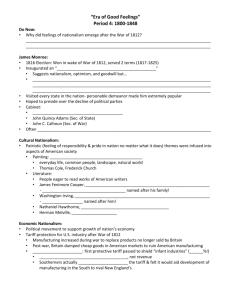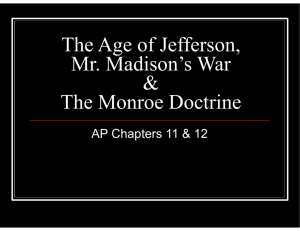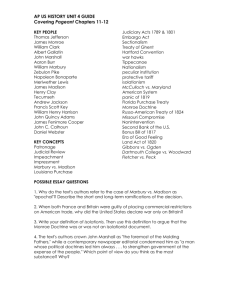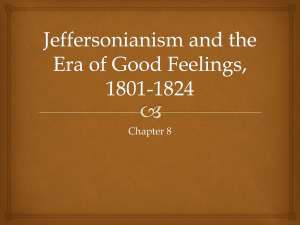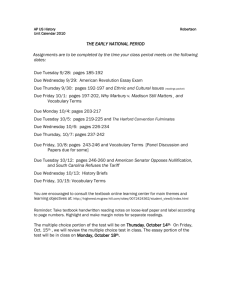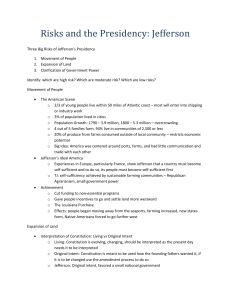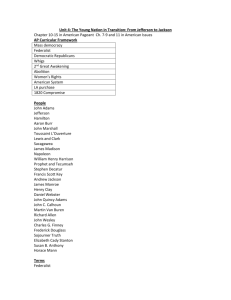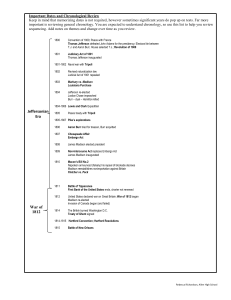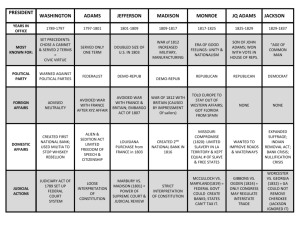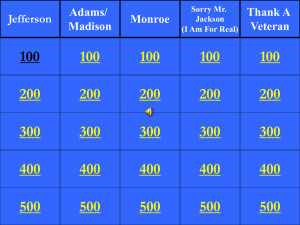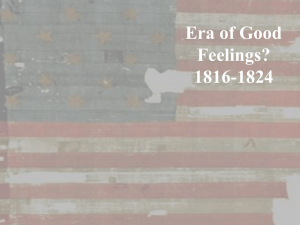Unit 3: 1800-1848 - The New Nation People Thomas Jefferson
advertisement
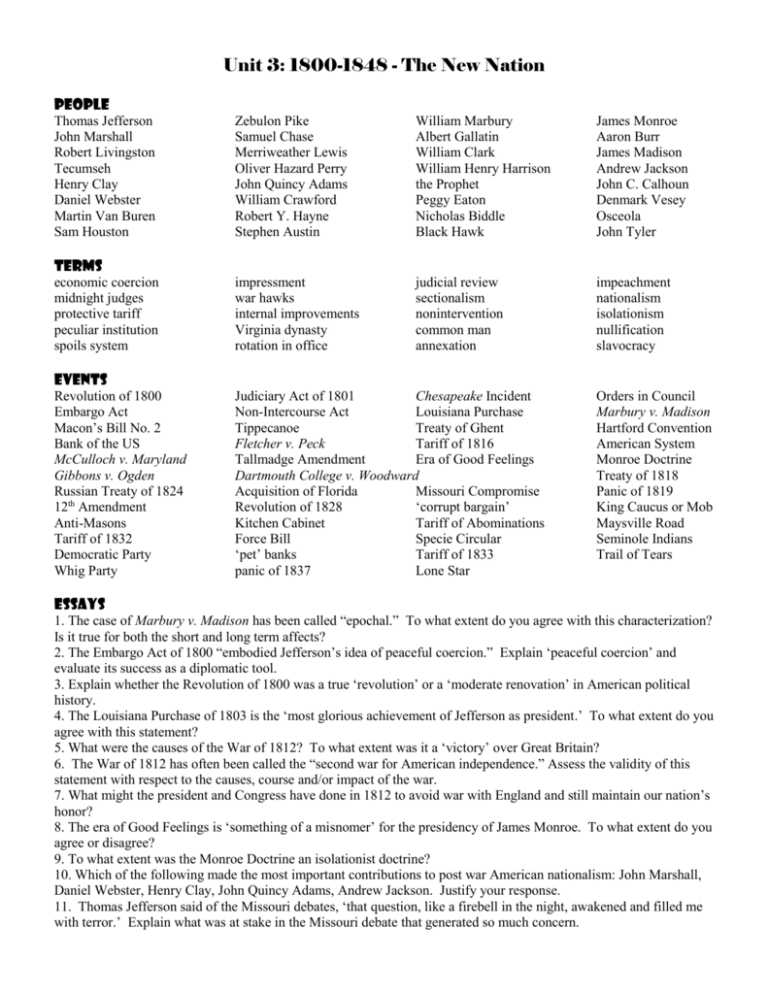
Unit 3: 1800-1848 - The New Nation People Thomas Jefferson John Marshall Robert Livingston Tecumseh Henry Clay Daniel Webster Martin Van Buren Sam Houston Zebulon Pike Samuel Chase Merriweather Lewis Oliver Hazard Perry John Quincy Adams William Crawford Robert Y. Hayne Stephen Austin William Marbury Albert Gallatin William Clark William Henry Harrison the Prophet Peggy Eaton Nicholas Biddle Black Hawk James Monroe Aaron Burr James Madison Andrew Jackson John C. Calhoun Denmark Vesey Osceola John Tyler impressment war hawks internal improvements Virginia dynasty rotation in office judicial review sectionalism nonintervention common man annexation impeachment nationalism isolationism nullification slavocracy Terms economic coercion midnight judges protective tariff peculiar institution spoils system Events Revolution of 1800 Embargo Act Macon’s Bill No. 2 Bank of the US McCulloch v. Maryland Gibbons v. Ogden Russian Treaty of 1824 12th Amendment Anti-Masons Tariff of 1832 Democratic Party Whig Party Judiciary Act of 1801 Chesapeake Incident Non-Intercourse Act Louisiana Purchase Tippecanoe Treaty of Ghent Fletcher v. Peck Tariff of 1816 Tallmadge Amendment Era of Good Feelings Dartmouth College v. Woodward Acquisition of Florida Missouri Compromise Revolution of 1828 ‘corrupt bargain’ Kitchen Cabinet Tariff of Abominations Force Bill Specie Circular ‘pet’ banks Tariff of 1833 panic of 1837 Lone Star Orders in Council Marbury v. Madison Hartford Convention American System Monroe Doctrine Treaty of 1818 Panic of 1819 King Caucus or Mob Maysville Road Seminole Indians Trail of Tears Essays 1. The case of Marbury v. Madison has been called “epochal.” To what extent do you agree with this characterization? Is it true for both the short and long term affects? 2. The Embargo Act of 1800 “embodied Jefferson’s idea of peaceful coercion.” Explain ‘peaceful coercion’ and evaluate its success as a diplomatic tool. 3. Explain whether the Revolution of 1800 was a true ‘revolution’ or a ‘moderate renovation’ in American political history. 4. The Louisiana Purchase of 1803 is the ‘most glorious achievement of Jefferson as president.’ To what extent do you agree with this statement? 5. What were the causes of the War of 1812? To what extent was it a ‘victory’ over Great Britain? 6. The War of 1812 has often been called the “second war for American independence.” Assess the validity of this statement with respect to the causes, course and/or impact of the war. 7. What might the president and Congress have done in 1812 to avoid war with England and still maintain our nation’s honor? 8. The era of Good Feelings is ‘something of a misnomer’ for the presidency of James Monroe. To what extent do you agree or disagree? 9. To what extent was the Monroe Doctrine an isolationist doctrine? 10. Which of the following made the most important contributions to post war American nationalism: John Marshall, Daniel Webster, Henry Clay, John Quincy Adams, Andrew Jackson. Justify your response. 11. Thomas Jefferson said of the Missouri debates, ‘that question, like a firebell in the night, awakened and filled me with terror.’ Explain what was at stake in the Missouri debate that generated so much concern. 12. Rank the following in the order of their importance in shaping America’s legal system: Marbury v. Madison, McCulloch v. Maryland, Gibbons v. Ogden, Fletcher v. Peck, Dartmouth College v. Woodward, Cohens v. Virginia. 13. The ‘era of good feeling’ ended with the election of 1824. Assess the validity of this statement. 14. A states’ rightist or a nationalist. Which term is more accurate in describing the policy decisions of Jackson’s administration? 15. The election of 1828 was more of a revolution than that of 1800. To what extent do you agree with this assertion? 16. In 1816, John Calhoun had supported the new tariff. In 1828 he denounced protective tariffs. Account for his changing position on the issue. To what extent did it reflect the rising sectionalism? 17. To what extent is it accurate to say that Andrew Jackson was a ‘presidential tyrant running roughshod over the Constitution?’ 18. Explain whether Andrew Jackson’s veto of the Bank of the United States was more of an constitutional, economic or political decision. 19. Compare and contrast the Virginia and Kentucky Resolutions to John Calhoun’s doctrine of nullification and secession. Who won the nullification crisis? South Carolina or the national government? 20. What is manifest destiny? Identify three events between 1816 and 1848 that support the idea that our ‘destiny’ came at considerable cost to others outside the US. Relevant SOLS VUS.1 The student will demonstrate skills for historical and geographical analysis and responsible citizenship, including the ability to a) identify, analyze, and interpret primary and secondary source documents, records, and data, including artifacts, diaries, letters, photographs, journals, newspapers, historical accounts, and art, to increase understanding of events and life in the United States; b) evaluate the authenticity, authority, and credibility of sources; c) formulate historical questions and defend findings, based on inquiry and interpretation; d) develop perspectives of time and place, including the construction of maps and various timelines of events, periods, and personalities in American history; e) communicate findings orally and in analytical essays or comprehensive papers; f) develop skills in discussion, debate, and persuasive writing with respect to enduring issues and determine how divergent viewpoints have been addressed and reconciled; g) apply geographic skills and reference sources to understand how relationships between humans and their environment have changed over time; h) interpret the significance of excerpts from famous speeches and other documents; i) identify the costs and benefits of specific choices made, including the consequences, both intended and unintended, of the decisions and how people and nations responded to positive and negative incentives. VUS.5 The student will demonstrate knowledge of the issues involved in the creation and ratification of the Constitution of the United States and how the principles of limited government, consent of the governed, and the social contract are embodied in it by e) appraising how John Marshall’s precedent-setting decisions established the Supreme Court as an independent and equal branch of the national government. VUS.6 The student will demonstrate knowledge of the major events from the last decade of the eighteenth century through the first half of the nineteenth century by a) explaining the principles and issues that prompted Thomas Jefferson to organize the first opposition political party; b) identifying the economic, political, and geographic factors that led to territorial expansion and its impact on the American Indians; c) examining the reasons why James Madison asked Congress to declare war on Great Britain in 1812 and how this divided the nation; d) relating the changing character of American political life in “the age of the common man” (Jacksonian Era) to increasing popular participation in state and national politics; e) describing the cultural, economic, and political issues that divided the nation, including tariffs, slavery, the abolitionist and women’s suffrage movements, and the role of the states in the Union.
